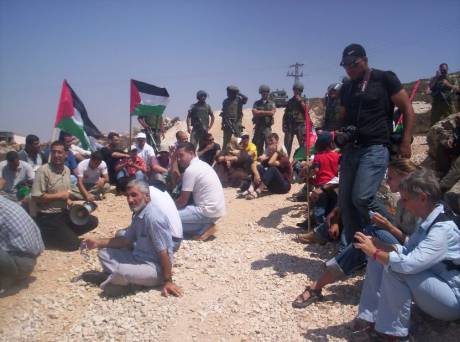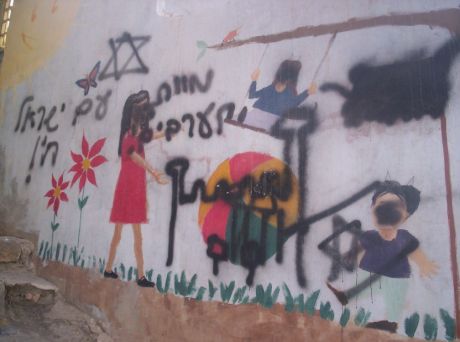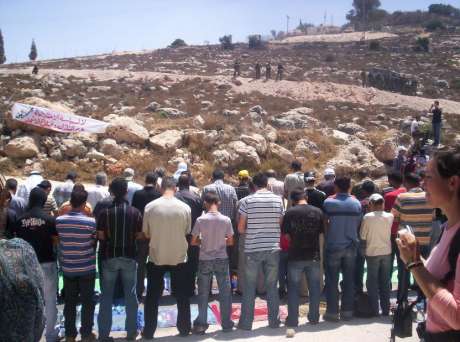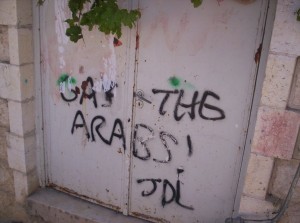Reflections from an Irish Activist with the ISM in Palestine
 international |
anti-war / imperialism |
feature
international |
anti-war / imperialism |
feature  Saturday September 08, 2007 20:56
Saturday September 08, 2007 20:56 by Damien Moran - Personal Capacity
by Damien Moran - Personal Capacity
The following is not intended to be an attempt at a comprehensive analysis of the current situation in the Occupied Territories of Palestine. Instead, it is a reflection on the past few weeks I have spent with the International Solidarity Movement in the city of Hebron and its environs and what brought me here in the first place. It is completely subjective and deliberately intended to be so. It is merely a personal reflection, and therefore should not be taken as representative of the views of the ISM.
I am a firm believer that the shortest distance between a person and the truth is a story. Many stories I have heard and read about regarding resistance to occupation, capitalism, imperialism have formed my sense of what is right and wrong - and on which side of the fence I am on. So if you manage to read through this lengthy piece of writing, I hope the stories of resistance I have encountered over the past few weeks will inspire you also to keep on fighting the powers that be, wherever and whenever you encounter them.
Related Links: Grafton Group plc - stacks of apartheid produce | Zionism : The rotten beam in the blind eye of a pitiless world? | IPSC pickett : Boycott Israeli Potatoes : TESCO Drumcondra | The Galway Races and the Ireland-Palestine Solidarity Campaign : Never the Twain Shall Meet? | Grafton Group plc - no corporate social responsibility | Palestine Solidarity
Part I
It's 8 a.m., Tuesday morning, and the city of Hebron - in the southern region of the West Bank of Palestine, has awoken. The initial morning calls to prayer from the surrounding mosques have well passed, a few Palestinian workers are wiping sleep from their eyes and some seem like they are in sleep-walking mode as they journey to work on foot from the heavily-militarised H2 Israeli district to the Palestinian Authority controlled H1 section.
It could be any other city in the world given the evident rituals of work, rest, and play - that is apart from the blatantly obvious fact that the city of Hebron is under a brutally repressive, 6,000 Israeli soldier strong, military occupation. And these soldiers are here to ‘protect’ the 600 or so settlers who live in the H2 area, which makes up 20% of all Hebron. Approximately 40,000 Palestinians lived in the area in 2005 but this number is steadily decreasing due to ever-increasing repression and violence
It is the first time I have ever lived in an occupied country. Even though I am from Ireland, the occupation of the Northern part of our country was a universe away for most of us who grew up in the southern Republic. Images that flashed on the screen on a daily basis when I was growing up remained just that - flashes on a screen. The impact of the Northern Ireland conflict on Irish society as a whole was nowhere to be seen, and was especially far removed from my home town, 130 kilometres away from the border. Yet, for those who have resisted imperialism and capitalism in the North of Ireland, the symbols of the Palestinian people and their struggle - which can be found in Republican areas of Northern Ireland - embody the universal spirit for true freedom. Fights against oppressive conditions tend to identify with each other easily and employ each others' symbols in a clear manifestation of mutual solidarity. Hence, one can also see the Kurdish flag and Basque flag in a variety of districts in Belfast and Derry. That said, I have yet to see a tricolour here! But once one says they are from Ireland the amazing hospitality and friendliness of Palestinians elevates to even higher levels than normal.
Despite the fact that this is my first time in the Middle East, I have had previous voluntary experience in Haiti, where I worked for 3 months in early 2001. The stark poverty there and amazing spirit of survival manifested through their great sense humour and generosity was a significant eye-opener for a 21 year old from the midlands of Ireland. Haitians taught me many valuable lessons then about simple living, just as Palestinians have been teaching me invaluable lessons about their struggle since I arrived here almost 4 weeks ago. The domestic societal pressures I and other Westerners face, from San Francisco to Warsaw, Oslo to Madrid - whether to choose Nike or Adidas, Levis or Wranglers, Coca Cola or Pepsi - seems like such bullshit falsity when measured against the fact that it is people like ordinary Haitians who slave labour for our commodity overload and Palestinians who bear the brunt of our nation's obsession with weapons sales to the Apartheid Israeli State.
Thankfully, groups like the ISM, Christian Peacemaker Team and many others exist to counter the exploitation and violence perpetuated by the political powerbrokers, cynical warmongers, and the ubiquitious capitalists.
In my own case, on return to Ireland after volunteering in Haiti, I had to decide whether I was to conform to the Irish Celtic Tiger economic expectation of attaining a brand-new 2.6 litre car, producing 2.3 children, constructing an 8 room house (3 times more than required), signing up for a 35 year mortgage in a cramped urban space with few social services, and putting aside a sufficent quantity of disposable income for 2 sun holidays a year in order to make up for the eternally falling rain in Ireland - and all by the time I would have reached 27 years old. Yes, I know, sounds pretty boring! And yet many feel forced into such economic and social traps, and of course not just in Ireland, by well-groomed real estate charmers, loan sharks and city councillor land rezoners, just because they want to start a family and bring up their kids in a secure environment.
That course of life may seem good to some, and more power to them if they can enjoy themselves and be active citizens at the same time. But for those of us who have had the privilege to form relationships with those who struggle to survive in their daily lives, whether amongst the poor and oppressed of the Global North or South, our responsibilities to respond through sharing some of their experiences and refusing to descend into slumber are to the fore of consciences. And that is exactly why I decided to come to Palestine (I know, it has taken me a while to get to this point) - to reignite my sense of responsibility towards the other, to develop mutually beneficial relationships with those having to confront occupation and violence in their normal daily rituals - of work, rest, and play
Anyhow, enough about soldiers. Thankfully I was free to come here, albeit for a short period of time, having no mortgage, kids (the only part of this triangle I would like to have) nor gas-guzzling car - and having a very understanding and supportive girlfriend and family to support me. I look upon it as a huge privilege and yet great challenge and responsibility to be able to travel and exerience resistance against occupation by the people here. They have much to teach us who live in countries ridden with individualism and materialism.
Even though I'm from Ireland, for the past two years I have been residing in Poland, teaching English and desperately struggling to learn the nightmarish Polish language. So when I decided to initiate contact with the ISM about the possibilities of working alongside them in Palestine, I started to recall previous stories of theirs which I had followed. A good friend of mine had been shot in the leg by an IOF soldier in 2002 while others had volunteered as short-termers. Last year I attended a very well produced play in Ireland which was based on the journals by the very inspiring ISM'er Rachel Corrie. And before I left Poland by train to make my way here I just managed to finish reading Jocelyn Hurndall's book about her son Tom, fatally shot by an IOF soldier in the Gaza Strip in 2003, just shortly after Rachel had been murdered.
Part II
The border police at Al-Ibrahimiye mosque and Cave of Machnela Synagogue checkpoint evidently need serious doses of caffeine to get into harrassment mode. They knock back glass after glass of Saada (black Arabic coffee), becoming gradually more vocal towards each other and Palestinian passers-by. This ultimately reaches fever-pitch, whereby the Master and Commander of the unit and one of the female officers are shouting for no apparent reason, apart from the fact that they like to do so. Ever hear of the proverb 'empty barrels make most noise?'
It was the first thing that I thought of when trying to figure out why they felt the need to assert themselves in such a verbally intimidating manner. Said, one of the first victims of detentions that morning, is in his mid-twenties - cleaner shaven than I am and impeccably dressed, he attempted to enter the mosque for prayers. 1 hour and 15 minutes later of standing in the sun (despite our appeals he be allowed to stand in the shade), the army and police having warned him not to talk to the interntional monitors nearby, he is informed that he cannot enter the mosque. His calmness acts as a sign that this is not the first time he has been refused, nor will it be the last.
He informs me through a Red Crescent delegate friend that he has been rejected for 2 reasons. For having CD-Roms in his folder, and for allegedly being a member of Hamas. The CD's are not confiscated and thus are hardly deemed a security threat. Said is also obviously not anyone of political significance, even if he is a member of Hamas, as he is allowed to go back the same he came. Freedom of movement is one of the basic tenets of a democracy, one we all take for granted, and one learns quickly to appreciate it even more while living in such a militarised area.
As I walked and talked with Said through the economically devastated Old City market area, a sizeable rock - about 7 inches in diameter - thrown from the roof of the adjoining Synagogue, narrowly missed us and local shop-owners. Unfortunately no steel mesh protection roofing has been constructed here so pedestrians are an open target for stone throwers. Not the ideal area to construct a moderately successful business in order to sustain your family with their daily needs! Hence the fact that shop owners have had to bolt up and get out - the tourism industry being all but devastated as a result of the occupation and consequential lack of security, bad publicity.
In Ireland, visitors often comment that our towns and cities are laden with pub after pub after pub. In the West Bank that can be rephrased to read - checkpoint after checkpoint after checkpoint or - barrier after barrier after barrier. According to B'tselem, the leading Israeli human rights organisation, the West Bank alone has over 40 manned and 470 physical obstacles that prevent freedom of movement. It is always unpredictable when one approaches a soldier, border police or police officer. The aim is to aid a detained Palestinian, to diplomatically (or not so diplomatically, depending on the situation) put pressure on them to speed up the process and subtly remind them that they are being watched. I have no doubt that the fact we take video camera footage while they are breaching people's civil liberties annoys them to a great extent, because they know they can't get away with their usual humiliating tactics which they deploy upon Palestinian civilians.
One can get used to their aggression, guns and ignorance easily. By attempting to divide and conquer, the Israeli security apparatus deliberately try to ruin the good relationships between internationals and Palestinians. But they have been without success, and the reciprocal respect between Palestinian locals and internationals, who have come alongside them to fight the occupation, only gets stronger and stronger against the occupier.
The consequences for our Palestinian friends, whether politically active or not, is cruel and arbitrary. Question the police or army's decision-making process with logic and persistence and you are sure to find yourself landed into a holding-cell, or maybe even prison - sometimes for up to six weeks, without any charges being brought or access to a lawyer, upholding of one's basic human rights. Habeas Corpus, a basic legal principle that has helped protect individual's civil liberties worldwide, quite simply does not exist here. Arbitrary detentions can last years without a person being charged or convicted. I've only spent 6 weeks in jail in Ireland (www.peaceontrial.com)for nonviolent political activity, so to begin to imagine such a nightmare scenario where there is no certainty of one's future nor for the welfare of one’s family, is quite simply impossible and dreadful at the same time.
Being an 'international' monitor at military checkpoints and generally behaving as a non-violent activist at actions against the Apartheid Wall, to give but one example, is a excellent experience, yet requires a great deal of patience, high energy levels and an ability to remain logical and organised under stress. In a sense, being an activist in Hebron at the moment is somewhat similar to a soldier's life. Long periods of relative inactivity are interspersed with spurts of intense activity. Things can flare up rapidly – settler attacks, new army checkpoints and harassment measures.
If things are relatively peaceful in our region of Palestine then we must be grateful for that peace and not fall into the trap of feeling bored. Being an activist doesn’t always mean you have to be ‘active’ on the frontlines or attend every action. Often, not being present in the local area can adversely affect your everyday ordinary work of living in a community and being on call if locals require your assistance.
I suspect there can be a tendency in all of us who have come here to be politically active and with an engaged activist mindset that if you're not being active by removing roadblocks, dodging tear gas canisters or confronting bulldozers then you are being under-utilised. It challenges our preconceptions of what work we thoguth we would be engaged in. The latter are of course all quintessential to going about the work of nonviolence, yet the daily drag of the occupation and the benefits of peaceful moments should not be under-played. They are opportunities to immerse into the community more, to meet as many people as possible, to play street soccer with the kids, to learn Arabic and teach English or other languages and to skills share with other activists, e.g. video editing, arts and crafts, language learning, juggling, chess playing, report and journal writing - the list is endless.
I greatly admire those who have put themselves forward and suffered much to oppose the occupation without use of arms. Yet for anyone who intends on joining the ISM for a short length of time my advice is not to be an activist tourist during you month or so long stay. Wherever you find yourself, be there fully with both mind and body.
Part III
Jewish settlers driving by give antagonistic glances and stares, while cars and bus loads of visitors to the nearby Jewish cemetery and 'tomb' of the ancient biblical figures of Jesse and Ruth every now and again have one ruthless passenger who rolls down the window and comments, 'Drop dead!' Being called a 'Nazi' by Jewish settlers is a regular occurence here - you just have to get used to it and not get pissed off.
Fawaz, a 21 year old English student, informed me this evening that he twice evaded a beating from the army and police as a result of the mere presence of International Solidarity Movement activists. It's good to get positive feedback and to know that one is at least preventing such crimes.
Later on in the day two semi-drunk Israeli soldiers of Russian origin aggressively break up our peaceful Tuesday evening by demanding we stop filming them. Understandably so, seen as we had earlier recorded them knocking back some cans of beer in the vicinity of the Palestinian house we were taking care of. They sexually harrass one of the female internationals present before cowering behind their military outpost once again.
The story behind Issa’s house in Tel Rumeida district is a key part of the successful nonviolent resistance waged here. The legal owners of the property carry blue I.D., meaning they are residents of East Jerusalem. The Israeli police informed them 7 years ago that they would lose their blue I.D. if they continued to live in the Hebron region, so they went back to Jerusalem and soon after the army occupied their house. They remained their on and off for the next 6 years years. When they eventually left in early 2007 settlers occupied the house and stripped it bare. All this despite the fact that Palestinian activists managed to legally receive confirmation from the Israeli High Court that only the owner should be allowed to live there, or a tenant of the owner. Now, though the house was ransacked by the army and settlers, Palestinian ISM’ers intend on developing it into a nonviolent base to confront the occupation. It's geographically positioned in a very significant area. Surrounded by olive groves, it finds itself located between the Tel Rumeida and Beit Hadassah settlements, hotbeds of extremism which have caused fear amongst the local Palestinian community for decades.
Atrocities have been committed against moderate, orthodox and extremist Israelis - but the concept that this is a war between two equals is a fallacy. It's more like pitching Barcleona against Doncaster United in the F.A. Cup (no offence intended).
The life of an activist in Hebron at the moment can be summarised as follows - early to rise in order to be at military checkpoint watch. Long periods of time being alert which needs to be constructively filled to pass the day due to the nature of the work involved. Anyone who has seen the Thin Red Line will know what I am talking about. Patience is the greatest of all virtues here. Not losing your cool is tough when you daily see such violations of peoples' civil liberties. And even when things are quiet, matters can escalate in a matter of minutes. Yesterday morning I walked out the door with a colleague to do checkpoint watch at Tel Rumeida hill and Shuhadah st., especially in order to ensure local kids and teachers starting school were not attacked by settlers nor harassed by soldiers. The Palestinian kids school in the H2 district, Qurtuba, suffered an arson attack just a few weeks ago and the school is still under repairs.
We were very surprised, as were our neighbours, to see a small machine gun stationed at a new checkpoint just 10 metres from the ISM apartment. A blue landmine (we've yet to confirm whether it was live or a dummy – the latter is likely) was positioned under the temporary roadblock, constructed just one hour before. So each and every person, man woman and child, were obliged to walk down a narrow passage by the road with an intimidating machine gun facing them and a very obvious belt of ammunition adjacent to it. At 10pm the same day soldiers were demanding the men who wanted to pass the checkpoint pull down their trousers. A couple of phone calls later from people who know the law alleviates the situation and the soldiers are disempowered from engaging in their completely unacceptable behaviour.
The Memorandum of Understanding signed between the Israeli and U.S. government on August 17th, regarding a 25% increase in the already collosal aid they are granted annually, though yet to be passed through Congress - which is but a mere formality at this stage, goes to the core of the prolems which exist here. $33 billion is to be granted over a 10 year period and half of this is planned to be spent on defence – or rather, offence. This blood money will be delivered efficiently and the occupation will be bankrolled for the next 10 years. So who will bankroll the nonviolence communities which need to grow and continue their quintessential work in the Occupied Territories? I can safely presume that those who have managed to read this far do not have over-bulging bank accounts, and are probably weighed down with debt most of their lives. But we have to push ourselves as much as possible to shake the bushes when we get back home and do all we can to ensure people know how and why to contribute to the ISM's work in Palestine.
In our common humanity we reap the seeds we sow, or all too often, we reap the seeds our governments choose to sow in our names. It's an anarchist cliche at this stage, but it's well worth remembering: 'war is the health of the state.' It rings true when one also takes into consideration the internal tensions and huge amounts of finance spent on weaponry by Israel, the P.A., Hamas, etc. So rather than gun factories being built, all of us who have worked with the ISM know that the anti-occupation forces here could do with a lot more nonviolent infantry, video and digital camera factories, checkpoint observors, rakes and mattocks to assist farmers tend to their land under attack from colonial settlers, ropes and tractors to remove roadblocks, boltcutters to cut the Apartheid fence and sledgehammers to bring down the wall. And even if you can only come for a short time, which unfortunately I was only able to afford this summer, the relationships one can develop with locals and the knowledge one can gain and share is invaluable.
And that is why I guess it is important to remember that the work of the international ISM'er is 20% in Palestine and 80% back in their home turf. I am so grateful to have worked alongside Palestinians and internationals whose efforts to struggle on, despite overwhelming opposition, is truly inspiring. Celebrating a common Palestinian/International humanity and our nonviolent action victories, our ability to remain nonviolent despite the daily violence we face, and telling our stories (by the way, thanks for reading this far) is so important to ensure that the next wave of ISM'ers know what to expect upon arrival.
I look forward to returning to see beautiful Palestine, Habibti.

Demonstrating in a Closed Military Zone against the Apartheid Wall - Walaje, Bethlehem

Anti+Arab graffiti near Qurtuba school - Tel Rumeida, Hebron

Palestininians pray before demonstration against the Annexation Wall
